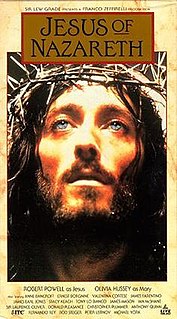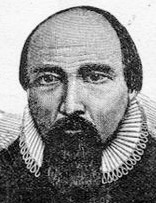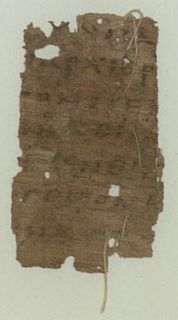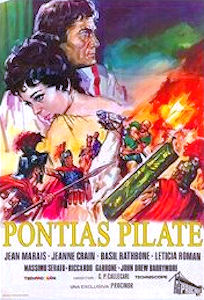
Jesus of Nazareth is a 1977 British-Italian epic film and television drama serial directed by Franco Zeffirelli and co-written by Zeffirelli, Anthony Burgess, and Suso Cecchi d'Amico which dramatizes the birth, life, ministry, crucifixion and resurrection of Jesus. It stars Robert Powell as Jesus, and features an all-star cast of actors, including eight who had won or would go on to win Academy Awards: Anne Bancroft, Ernest Borgnine, Laurence Olivier, Christopher Plummer, Anthony Quinn, Rod Steiger, James Earl Jones, and Peter Ustinov.

Barabbas was, according to the New Testament, a prisoner who was chosen by the crowd in Jerusalem, over Jesus, to be pardoned and released by Roman governor Pontius Pilate at the Passover feast.

The King of Kings is a 1927 American silent epic film produced and directed by Cecil B. DeMille. It depicts the last weeks of Jesus before his crucifixion and stars H. B. Warner in the lead role.

King of Kings is a 1961 American epic film directed by Nicholas Ray and produced by Samuel Bronston for Metro-Goldwyn-Mayer. Adapted from the New Testament, the film tells the story of Jesus of Nazareth from his birth and ministry to his crucifixion and resurrection. It stars Jeffrey Hunter as Jesus, with Siobhán McKenna, Robert Ryan, Viveca Lindfors, Ron Randell, Hurd Hatfield, and Rip Torn.

Barabbas is a 1961 religious epic film directed by Richard Fleischer, expanding on the career of Barabbas, from the Christian Passion narrative in the Gospel of Mark and other gospels. The film stars Anthony Quinn as Barabbas, features Silvana Mangano, Katy Jurado, Arthur Kennedy, Harry Andrews, Ernest Borgnine, Vittorio Gassman, and Jack Palance, and was distributed by Columbia Pictures. It was conceived as a grand Roman epic, was based on Nobel Prize-winning Pär Lagerkvist's 1950 novel of the same title. A previous film version of the novel, in Swedish, had been made in 1953.
The Miracle Maker is a 1999 British-Russian-American stop motion-animated film about the life of Jesus Christ, through the eyes of Tamar; the terminally ill daughter of Jairus, a priest in Capernaum. Hand-drawn animated cartoons are used to distinguish flashbacks, parables, stories, spiritual encounters and visions from the main plot, which is all in stop motion.

The Passíusálmar or Passion Hymns are a collection of 50 poetic texts written by the Icelandic minister and poet, Hallgrímur Pétursson. The texts explore the Passion narrative, as traditionally presented, from the point where Christ enters the Garden of Gethsemane to his death and burial. Hallgrímur began composing the work in 1656, while serving as pastor of Saurbær in Hvalfjörður. It took him three years to complete, the final poem being written in May 1659; the first edition was published seven years later, in 1666. By the end of the century they had become so popular in Iceland that five editions had been published. Since that time, they have been reprinted more than 75 times, a unique achievement in Icelandic literature. The poems were translated into many other languages, including Latin, English, Chinese and Danish.

Matthew 27 is the 27th chapter in the Gospel of Matthew, part of the New Testament in the Christian Bible. This chapter contains Matthew's record of the day of the trial, crucifixion and burial of Jesus. Scottish theologian William Robertson Nicoll notes that "the record of this single day is very nearly one-ninth of the whole book".

Jesus is a 1999 Italian-American biblical historical drama television miniseries that retells the historical events of Jesus Christ. It was shot in Morocco and Malta. It stars Jeremy Sisto as the titular character, Jacqueline Bisset as Mary of Nazareth, Debra Messing as Mary Magdalene and Gary Oldman as Pontius Pilate. The miniseries was broadcast in Italy in two parts on December 5 and 6, 1999 before being broadcast in the United States on May 14 and 15, 2000.

The Last Days of Judas Iscariot is a play by American playwright Stephen Adly Guirgis first staged Off-Broadway at The Public Theater on March 2, 2005, directed by Philip Seymour Hoffman.

Judas is a 2004 Biblical television drama film depicting the intertwined lives of Judas Iscariot and Jesus of Nazareth. The story depicts Judas as having sympathetic motives, desiring to free the Jewish people from Roman rule. It was shot in Ouarzazate, Morocco.
Barrabas or Barrabás are the Spanish and Portuguese name for Barabbas, the prisoner who, according to the New Testament, was chosen by the crowd in Jerusalem, over Jesus of Nazareth, to be pardoned and released by Roman governor Pontius Pilate at the Passover feast.

In the canonical gospels, Pilate's court refers to the trial of Jesus in praetorium before Pontius Pilate, preceded by the Sanhedrin Trial. In the Gospel of Luke, Pilate finds that Jesus, being from Galilee, belonged to Herod Antipas' jurisdiction, and so he decides to send Jesus to Herod. After questioning Jesus and receiving very few replies, Herod sees Jesus as no threat and returns him to Pilate.

Pontius Pilate is an Italian drama film from 1962, directed by Gian Paolo Callegari and Irving Rapper, written by Oreste Biancoli, starring Jean Marais and Jeanne Crain.

The Day Christ Died is a 1980 American television film directed by James Cellan Jones. The collaborative production by 20th Century Fox and CBS-TV dramatizes the last 24 hours of Jesus Christ's life and is based on Jim Bishop's 1957 book of the same name. The book was co-adapted by James Lee Barrett, who, 15 years prior, had scripted The Greatest Story Ever Told for George Stevens.

Mary Magdalene is a 1914 silent film that costars Arthur Maude and Constance Crawley and is loosely based on the 1910 play of the same name by Belgian playwright Maurice Maeterlinck.

Son of God is a 2014 American epic biblical film directed by Christopher Spencer, and produced by Mark Burnett and Roma Downey. The film retells the life of Jesus and is an adaptation of the ten-hour miniseries The Bible, which aired in March 2013 on the History channel, and immediately following the movie begins another TV series called A.D. The Bible Continues.

Mary of Nazareth is a 2012 Italian-German-Spanish television movie directed by Giacomo Campiotti. It focuses on life events of Mary of Nazareth, Mother of Jesus, and Mary Magdalene.
Wine of Morning is a 1955 American film directed by Katherine Stenholm and starring Al Carter, Joan DeVolk, and Katherine Helmond. It has Barabbas as the subject, who was pardoned according to the Biblical report in place of Jesus Christ by Pontius Pilate.
Day of Triumph is a 1954 American drama film directed by Irving Pichel and John T. Coyle, from a screenplay by Arthur T. Horman. The film stars Lee J. Cobb, Robert Wilson, James Griffith, and Joanne Dru.


















